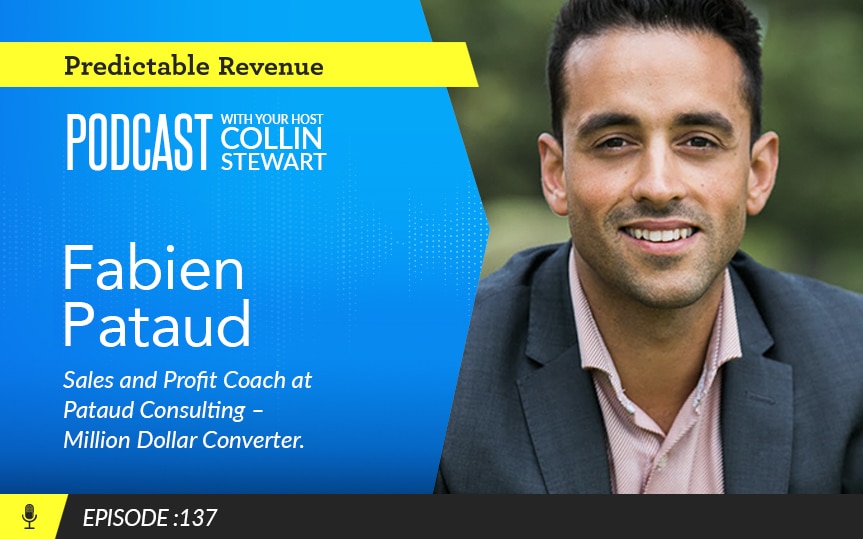Turn Coffee Meetings Into Dollars

Getting together for coffee: it’s a request that comes to entrepreneurs and salespeople all the time.
And it’s enticing – you never know what will come from a chat with a new connection. Growth is critical to any business, and keeping the door open to anything that may contribute to growth just feels prudent… right?
Well, not exactly. At least, not according to Fabien Pataud, Sales and Profit Coach at Pataud Consulting.
Sure, coffee with someone that could possibly make you money is attractive, but when was the last time one of the many coffee meetings you went on actually contributed to your pipeline? Moreover, when have those coffee meetings ever regularly contributed to your pipeline?
“I turned to networking when I launched my business and didn’t yet have a website or any other marketing materials. Part of that networking was coffee meetings. I, like many others, figured you never know what will happen, so I took a lot of those meetings,” says Pataud, on a recent edition of The Predictable Revenue Podcast.
But, coffee meetings take a long time, you have to take the time to travel to and from, as well as the meeting itself. Unfortunately, the ROI on them isn’t huge – nothing ever really happens. And time is money.
Turning coffee into real dollars
Of course, coffee meetings aren’t stopping, for Pataud or any other entrepreneur. So how did Pataud turn those still-important coffee meetings into dollars? How did he make sure his time was money?
He started qualifying those that wanted to have coffee with him – a trick he learned from Michael Griffith’s Referral Marketing framework.
“I started utilizing the discovery call process for those coffee meetings to make them more efficient. It wasn’t easy, though. Most people like the old way of having coffee where things go nowhere. It caught people off guard, but it actually was to make the meetings better,” says Pataud.
By having a discovery call before confirming a coffee meeting I was able to make sure it was actually worth our time to meet, as well as prepare my thoughts on plans for when we did get together. This actually kicks off the sales process.
(Editor’s note: we had Jeroen Corthout, Salesflare Co-Founder, on the pod a while back to discuss how he got his first 100 customers. You read about our chat here, or listen to the whole in-depth interview here)
The framework
What types of questions does Patuad ask on those discovery calls?
According to him, the key areas to identify before you have a meeting are:
- Whether or not you believe you can help at all.
- If they are in direct competition with you.
- And, finally, if you have shared alignment on values and mindset, and if they appear fun and easy to work with.
After considering those critical topics, Pataud recommends asking yourself these questions:
- Have I worked with this kind of person before? If so, how did it go?
- If not, do I have credibility in this area?
- Am I experienced enough to help? And, how confident am I that I can get them the result they need?
People who succeed take action, and take the right action. So, I have to be careful about where I spend my time – and these questions help me do that. If I don’t get that return, I’m costing myself money. You have to say no, in fact, you have to say no a lot.
“We tend to say yes often, because we don’t know what is behind a door. But, you have to work out what is behind the door before you open it. You need to say focused, and looking forward, not spread a round in multiple directions.”
The meeting
Once you’ve done your qualification and it’s apparent that meeting is necessary – it’s time to prepare.
And, depending on the nature of the meeting, there is a couple of different ways you prepare:
- Either for a sales meeting (you’re selling to the other party in the meeting)
- Or, for a partnership meeting, in which both yourself and the other party can mutually help one another by introducing potential customers.
If it’s a partnership meeting, then Pataud stresses doing some homework and bringing with you some potential leads for the other party. Who can you introduce them to? This establishes your interest in supporting them, and will inspire them to do the same.
If the meeting is more sales focused, and you think the party you are meeting could become a customer, then framing the meeting as such from the get-go is critical.
In these meetings I tend to veer away from spending the first chink of the meeting building rapport. Time really is money.
“So, set that up very early in the chat – make it efficient and valuable.”
To aid in that efficiency, Pataud suggests scheduling the coffee meeting at one of the party’s respective offices as it can be tough to close someone in a crowded cafe.
Because that’s what he tries to do: when at a sales meeting, he opens the meeting by saying he is going to ask direct questions, in order to understand their business completely.
From there, he moves quickly to discussing an action plan that includes details about onboarding and payment details. If there is resistance, Pataud makes sure to turn the floor back to the prospect so they can deal with objections as needed.
Biggest element is the genuine authenticity at the beginning. Pull all the objections out nice and early – don’t waste people’s time.
So be quick and get to it.
For more on Pataud’s philosophy on meetings – including the effect this framework has had on is bottom line – check out the rest of his interview on The Predictable Revenue Podcast.
NO TIME TO READ?
Listen On:


